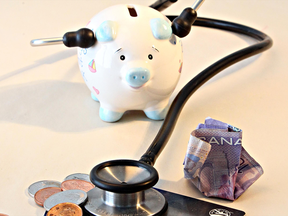Sandra Fry: Here are some practical tips to help Canadians gain an understanding of their living costs and spending habits

Reviews and recommendations are unbiased and products are independently selected. Postmedia may earn an affiliate commission from purchases made through links on this page.
Article content
The high cost of living has become the new normal for many, which often leads to blaming your debt on living expenses, which can prevent you from recognizing your spending habits, addressing your debt problem and working towards financial stability, but it isn’t always that obvious.
Consider the situation of a married couple with two young children. They have been accumulating debt without a clear understanding of its origins since buying their home at the peak of the pandemic real estate market. One parent left their job to stay home due to daycare challenges.
Advertisement 2
Article content
Despite a low mortgage rate, their monthly home equity line of credit (HELOC) payments increased by $400 due to higher interest rates and continued spending. The stay-at-home parent manages the finances, while the other was unaware that taxes hadn’t been filed for three years due to fearing a Canada Emergency Response Benefit (CERB) repayment bill. Consequently, they are missing out on Canada Child Benefit payments and other government cash-back programs, which they desperately need.
Article content
Here’s another typical example. A young adult who graduated about a year ago had to start paying rent after living at home rent-free while studying. Their rent increased to $850 from $500 after securing a full-time job, but they never adjusted their budget to account for their new income and higher expenses. As a result, they accumulated more than $7,500 in high-interest credit card debt and took out payday loans to cover rent. Now, they are overwhelmed and facing garnishments on their paycheques.
It’s easy to complain about being stressed by the high cost of living, but many clients, including those in the scenarios above, lack a thorough understanding of their actual living costs and spending habits. There’s no doubt that things have gotten more expensive, but this lack of insight often translates to feelings of helplessness and a loss of control.
Article content
Advertisement 3
Article content
If you’re feeling the same way, here are practical tips to help manage your money better.
Tracking your spending is crucial for identifying your habits and understanding where your money goes. Monitor your household’s discretionary spending for a few weeks and list your fixed bills and costs. Use apps, spreadsheets or even pencil and paper to help ensure your tracking method doesn’t hinder you from following through.
Once you have a clearer picture of your spending, start outlining a budget. Allocate funds for necessities first: housing, transportation, groceries, daycare, medical costs and debt payments typically top the list. Once your necessities are covered, start filling in what you can spend on your discretionary expenses.
Your first budget outline likely won’t balance; you’ll have identified more expenses than what your income covers. However, it leaves you with solid information about where you need to make some choices and changes. For example, look at your fixed bills to see which ones can be eliminated or reduced.
- Electricity: contact your provider to find out if equal monthly billing is an option and what your payment would be.
- Cellphone/internet: scale down your level of service and/or ask about a cheaper package.
- Mortgage: contact your lender to see what options you might have to lower your payments.
- Rent: move to a less expensive area or find a way to share costs, such as taking in a roommate or renting out storage space in the garage.
- Child-care costs: ask family if they can help one day a week. See if you can trade off with another parent one day a week or whether you and your partner can temporarily stagger work hours/days to minimize how much outside child care you need.
- Subscriptions: review them all and cancel any you don’t use regularly.
- Start planning your meals to save on grocery and food expenses.
Advertisement 4
Article content
Negotiate all your bills and obligations, as even small reductions can add up over time. Shop strategically to take advantage of discounts, deals, cash-back rewards or loyalty programs.
To manage discretionary spending and stick to your budget, allocate a small amount of cash for personal treats. Setting aside even $20 per paycheque for things such as an occasional coffee or a drink after work can significantly boost your self-esteem and willingness to stick to your spending plan.
Examining your bills and expenses closely serves multiple purposes: it helps identify savings opportunities, reveals your true expenses and indicates if you need to combine reduced spending with increased income and an effective debt-management program.
Sometimes the biggest change someone needs is to reduce their debt payments to free up cash for other expenses, but doing that can require professional help from a lender or credit counsellor.
Recommended from Editorial
But as you take control and make positive changes, the feelings of helplessness around your money will start to fade and you’ll gain confidence that you can manage effectively despite the high cost of living.
Sandra Fry is a Winnipeg-based credit counsellor at Credit Counselling Society, a non-profit organization that has helped Canadians manage debt for more than 27 years.
Bookmark our website and support our journalism: Don’t miss the business news you need to know — add financialpost.com to your bookmarks and sign up for our newsletters here.
Article content




